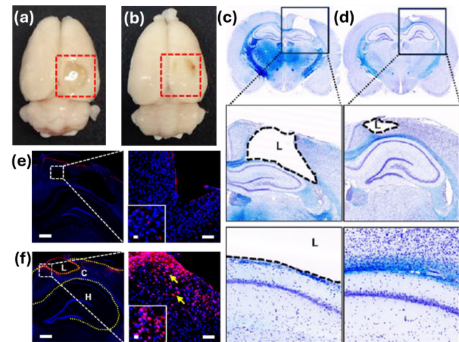

Reduction in cortical lesion volume post-TBI (a) and post-treatment (b); remyelination as shown by luxol fast blue-staining post-TBI (c) and post-treatment (d); and enhanced expression of occludin post treatment (f) as compared to post-TBI (e).
Invention Summary:
More than 3 billion people worldwide are affected by central nervous system injuries and diseases, including traumatic brain injuries, neurodegeneration, and glioma. As many as 30% of these patients experience persistent neurological deficits following mild CNS injury, with rates as high as 65% in moderate-to-severe cases. Extracellular Vesicles have emerged as a breakthrough therapy for CNS repair, combining the regenerative benefits of stem cells without their limitations, and are projected to reach a $700+ million market by 2030. EVs deliver critical paracrine signaling factors to promote tissue regeneration at the injury site. However, current EV formulations lack targeting specificity and exhibit rapid, uncontrolled release, limiting therapeutic efficacy.
Rutgers University Distinguished Professor KiBum Lee and his team have previously developed a novel injectable hydrogel technology. They have now demonstrated the delivery of hypoxia-conditioned extracellular vesicles using this injectable hydrogel. In a rodent model of TBI, this treatment resulted in enhanced hippocampal neurogenesis, oligodendrocyte preservation, and a reduction in neuroinflammation. In addition, the treatment significantly decreased cortical lesion volumes, restored blood-brain barrier integrity and promoted functional recovery.
Market Applications:
Advantages:
Publications:
• Stein, J. B. et al. Advanced Biomaterial Delivery of Hypoxia-Conditioned Extracellular Vesicles (EVs) as a Therapeutic Platform for Traumatic Brain Injury. Advanced Science, e04147.
Intellectual Property & Development Status: PCT application filed for background technology. Provisional application filed for this technology. For any business development and other collaborative partnerships contact marketingbd@research.rutgers.edu